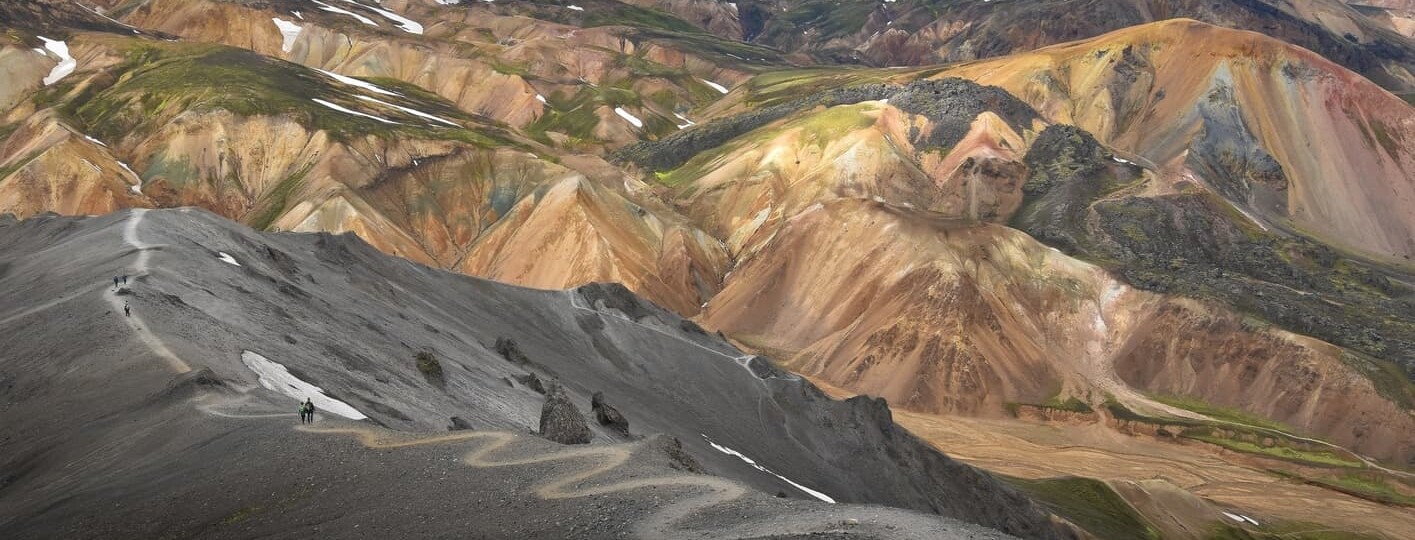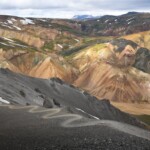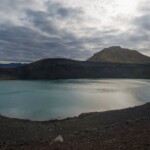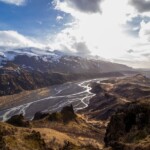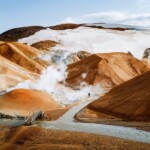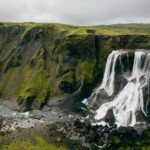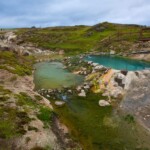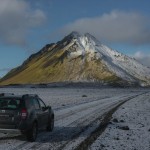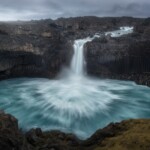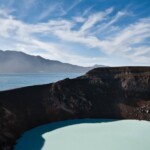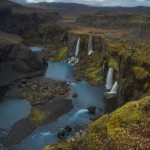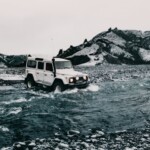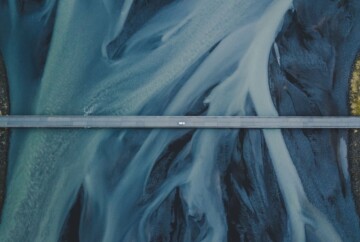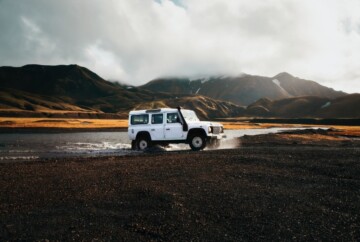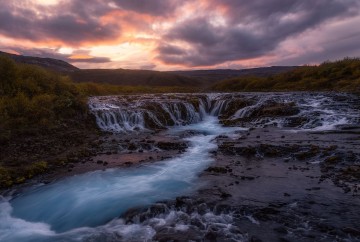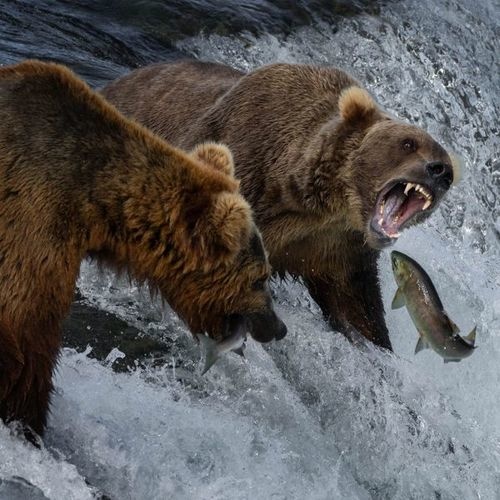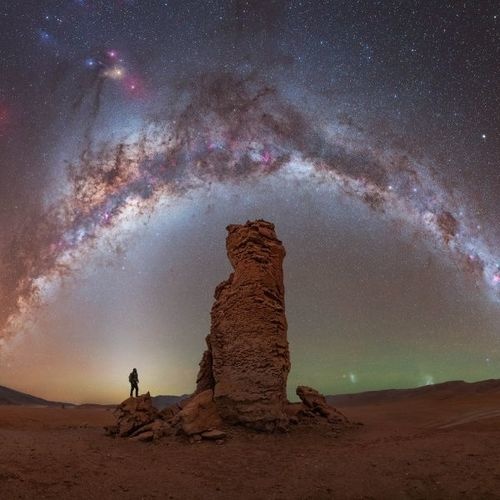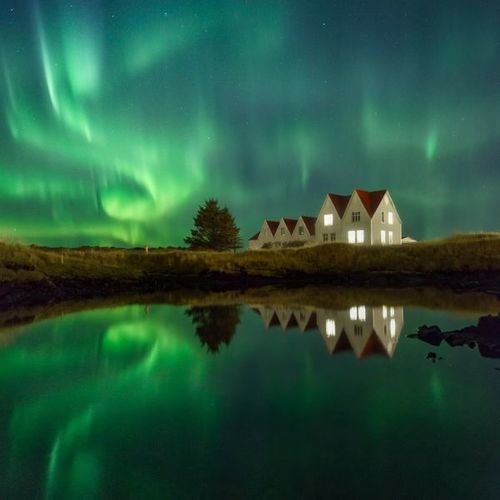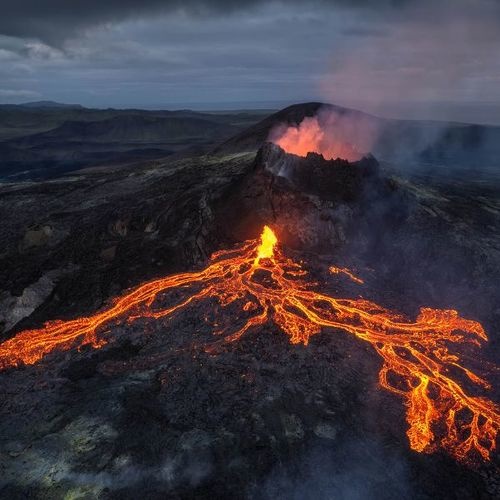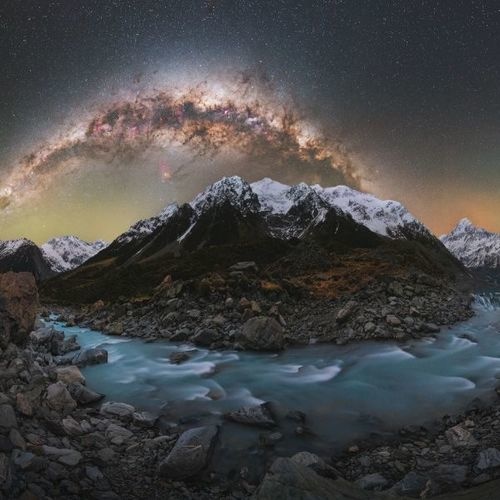The Highlands of Iceland has some of the most impressive landscapes in the country.
The Highlands occupy most of central Iceland, and this remote area is full of glaciers, lava fields, deserts, and volcanic ash. If you enjoy exploring or hiking through otherworldly environments, visiting the Icelandic Highlands is a must!
While most of the tourists that come to Iceland only drive on the Ring Road, you’ll have to traverse the F-roads of Iceland’s Highlands if you want to see this area. These roads usually close in the winter due to snow and ice, and even during the summer, you’ll need a 4×4 since most of the roads aren’t paved. You’ll also find yourself wading through rivers, so a vehicle with four-wheel drive is essential.
Before taking a tour of Iceland’s Highlands, I recommend reading our guide on how to drive in Iceland to better prepare yourself. You can also check our article with tips for renting a car in Iceland to learn more about the type of vehicle and insurance coverage you need. Certain policies only cover specific circumstances, so it’s best to do your research before venturing into the Highlands.
1. Landmannalaugar, the most popular place in the Highlands of Iceland
Landmannalaugar is a must-see in the Highlands of Iceland. It’s part of the Fjallabak Nature Reserve, and thanks to its frequent volcanic activity, you can find some of the most spectacular landscapes in the country here.
One of the main attractions is the Brennisteinsalda volcano, which has become one of the most iconic images of this place. While it’s not that tall, it has an impressive display of colors: sulfuric yellows, mossy greens, ash blues, and hints of black from the lava.
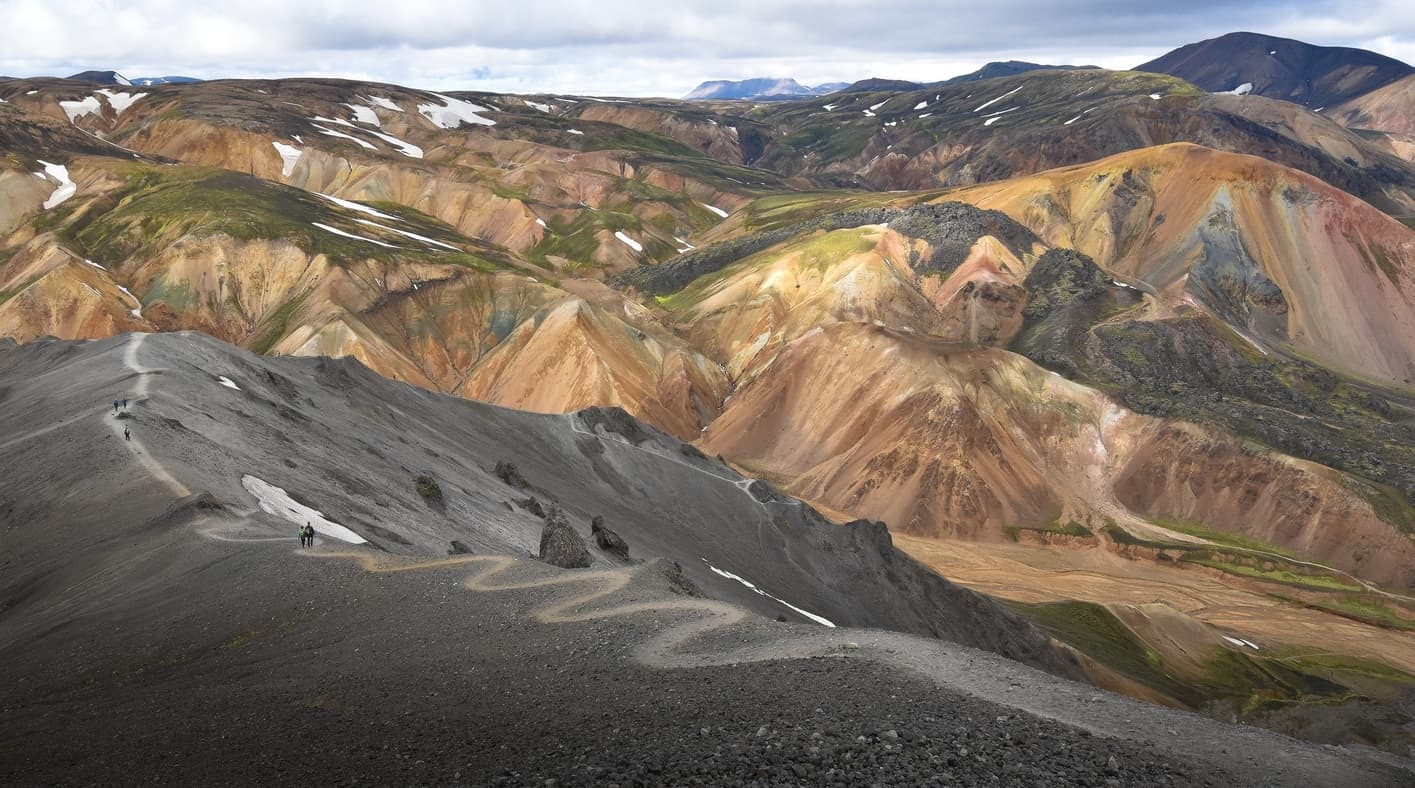
1. Landmannalaugar, the most popular place in the Highlands of Iceland
Another reason to visit Landmannalaugar is that it’s home to some of the best hot springs in Iceland as well as the Hekla volcano, the most active volcano on the island.
However, what makes Landmannalaugar one of the best places to visit in the Icelandic Highlands are the amazing hiking trails that weave between colorful mountains. The most popular multi-day trail is the 32-mile Laugavegur route that takes you to Thórsmörk. If you’re looking for a shorter hike, the 3.7-mile Bláhnúkur route to Iceland’s blue mountain is a good choice. Both trails are considered some of the best Iceland hikes.
- How to get there: The easiest way to get to Landmannalaugar is via the F208 road. You’ll need a 4×4, but the road isn’t as bad as other F-roads we’ve driven on. You can also book this day trip from Reykjavik if you don’t want to drive.
- Difficulty: Medium
- River crossing: Optional (there is a river at the entrance, but most travelers park further away and cross the footbridge to avoid driving through the water).
- Accommodation: Landmannalaugar Camping (one of the best campgrounds in Iceland) or Mountain Hut. All the information can be found here.
2. Þórsmörk, the best place for hiking in Iceland’s Highlands
Þórsmörk, or Thórsmörk, is the valley between the Tindfjallajökull and Eyjafjallajökull glaciers, and it’s one of the best hiking spots in the Icelandic Highlands. It is also one of the Highlands’ most remote areas, as the valley is furrowed by several glacial rivers, and is only navigable with a 4×4.
The Gígjökull glacial tongue is a popular attraction in this area, as is the Eyjafjallajökull volcano, which erupted in 2010, spewing tons of ash and halting air traffic across Europe. Another cool place to visit in Thórsmörk is the Stakkholtsgjá gorge, a canyon that runs over a mile long and over half a mile deep.
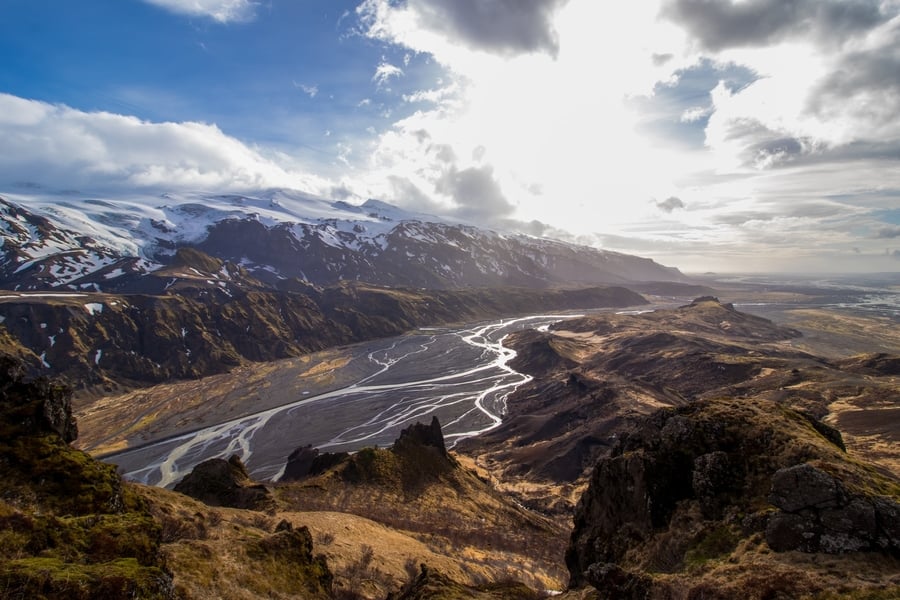
2. Þórsmörk, the best place for hiking in Iceland’s Highlands
To discover all the wonders hidden at Þórsmörk, I recommend taking some of the most popular walking trails. These include the multi-day Laugavegur route, which stretches 32 miles from Landmannalaugar to Thórsmörk, and Fimmvörðuháls, a 15.5-mile trail that leads to Skógafoss, one of the most beautiful waterfalls in Iceland.
You can also combine these routes into a 48-mile trek. Whichever route you take, I recommend getting the Iceland On Your Own Hiking Pass, which includes transportation to/from Reykjavik and the start/end point on your route.
If you’re looking for a shorter hike, take the Valahnukur and Tindfjöll Circle routes, which are perfect for an Icelandic Highlands day tour.
- How to get there: To get to Thórsmörk, take F249 from the Seljalandsfoss waterfall in southern Iceland. You’ll have to cross several substantial rivers, so not just any 4×4 will do. The easiest way to get there is with this bus company. Alternatively, you can take this guided hiking tour from Reykjavik.
- Difficulty: High
- River crossing: Yes
- Accommodation: Volcano Huts Þórsmörk
3. Kerlingarfjöll, one of the best Iceland Highlands day tours
Kerlingarfjöll has several different hiking trails, making it one of the best places to enjoy a full-day Iceland Highlands tour.
Here, you’ll find beautiful rhyolite hills, valleys, glaciers, and a lot of geothermal activity, so the landscapes are beautiful. The best way to explore this area is to take the route to the Hveradalir geothermal valley. The mountain peaks that make up this range are usually covered in snow year-round, and together with the vapors from the hot springs, it creates a unique scene you won’t find anywhere else.
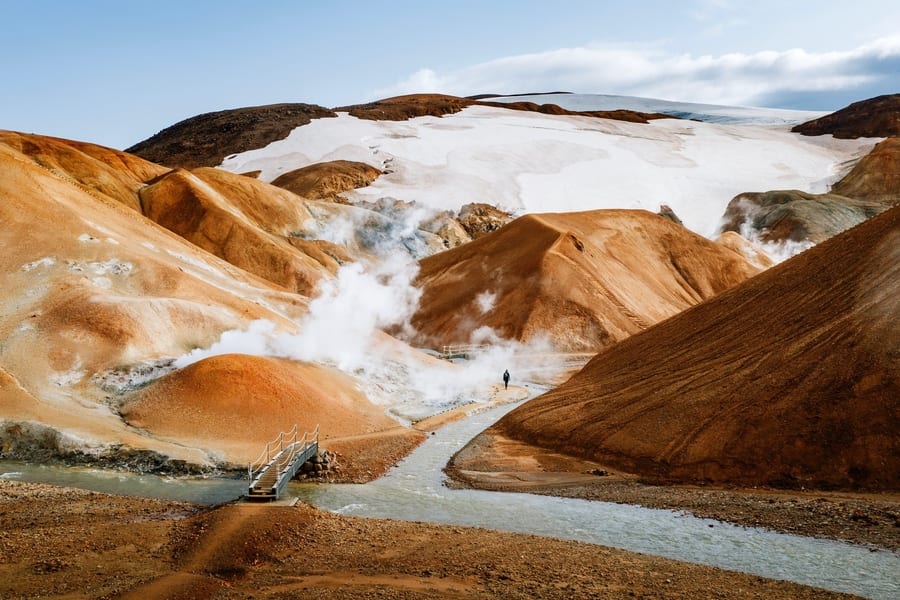
3. Kerlingarfjöll, one of the best Iceland Highlands day tours
From the mountain resort, it’s about a 10.5-mile hike, but if you’re short on time, you can park in the lot at the geothermal area and walk the 3-mile circuit that runs through it.
- How to get there: To get to Kerlingarfjöll, take the F35 road that crosses Iceland from north to south. This road, also known as Kjölur Route or Kjalvegur, is pretty easy and well-maintained, but unpaved. The entire journey is about 1.5 hours from the Golden Circle.
- Difficulty: Medium
- River crossing: No
- Accommodation: Either stay overnight at this mountain resort or camp on your own
4. Hveravellir, the best hot springs in the Highlands of Iceland
Continuing north on F35, you’ll reach another popular spot in Iceland’s Highlands, Hveravellir. Here, you’ll find some of the best hot springs in Iceland with spectacular colors.
We spent one night in the mountain hut here, and while it wasn’t cheap, we loved staying in such an idyllic setting. The old wooden cabin we slept in had a 30-person capacity as well as a small thermal bath right outside the hut, which was perfect for relaxing in after a long day of hiking the Icelandic Highlands.
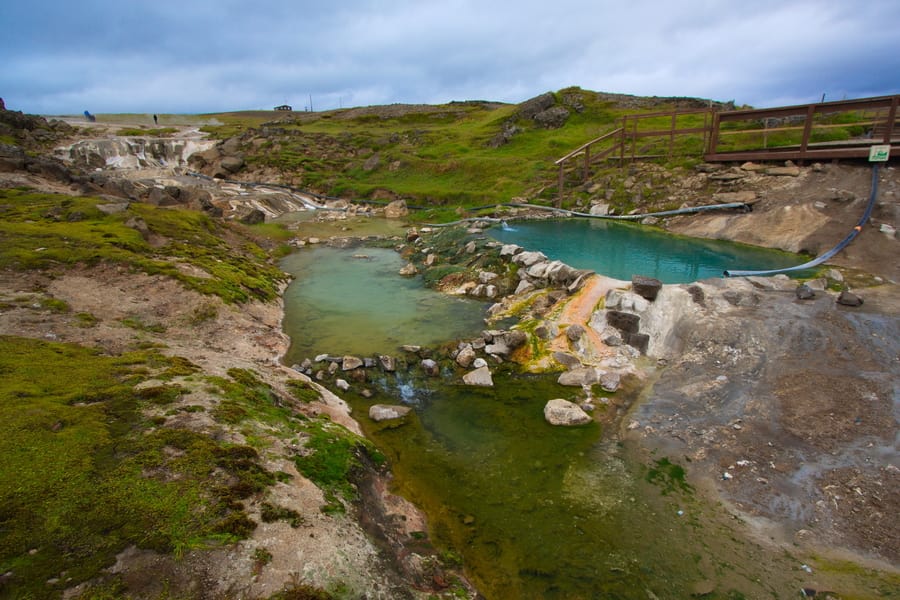
4. Hveravellir, the best hot springs in the Highlands of Iceland
- How to get there: Take the F35 road to Hveravellir. It takes about 1.5 hours to drive north from the Kerlingarfjöll resort.
- Difficulty: Low
- River crossing: No
- Accommodation: Camp overnight or stay at the Hveravellir mountain hut
5. Maelifell, the most breathtaking Iceland Highlands self-drive trip
In the southern Highlands of Iceland, you’ll find Maelifell, a nearly 2,625-foot extinct volcano that stands opposite the Mýrdasjökull glacier. This is the country’s 4th-largest glacier and is famous for the Katla volcano, one of the most dangerous in Iceland.
You can only get to Maelifell in the summer months when the snow has melted, and everything is covered in moss. It’s easy to recognize the Maelifell volcano by its perfect conical shape. Besides, the volcano sits atop the black ash desert of Mælifellssandur, creating an incredible contrast with the dense layer of green moss. You can’t miss it!
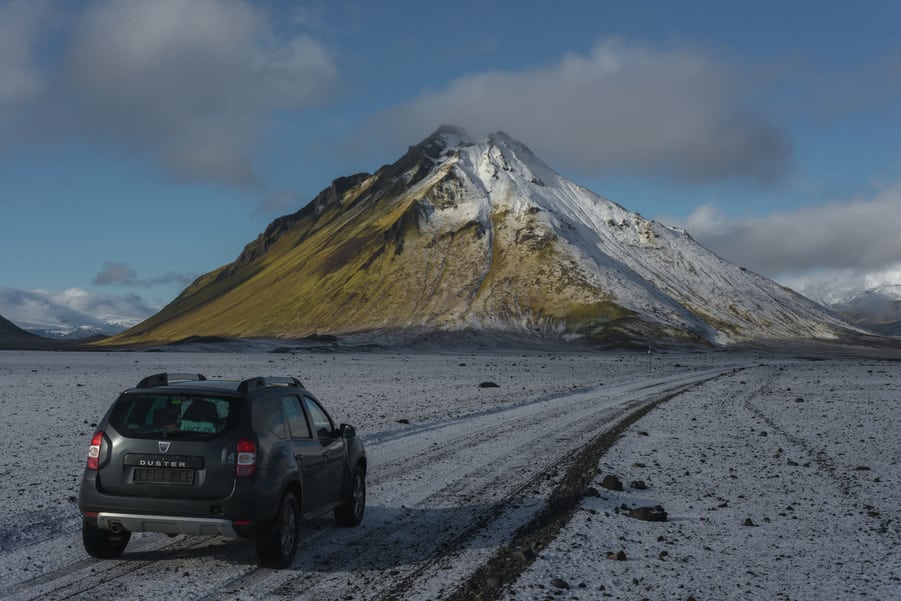
5. Maelifell, the most breathtaking Iceland Highlands self-drive trip
Getting to Maelifell is an adventure in itself, and we liked the route to the volcano almost as much as the volcano itself. The landscapes you’ll find on the way, such as the Markarfljótsgljúfur Canyon, seem like something out of a fairytale.
- How to get there: Not all 4x4s are suitable for the journey to Maelifell. There are many rivers along the way, and they can be quite tedious if it has recently rained. We took F261 to F210, but you can also get there by taking F210 Grafarkirkja and passing through the beautiful Axlafoss waterfall. Before you take either route, I strongly recommend checking the road conditions on Road.is or over the phone (+354-522-1100).
- Difficulty: High
- River crossing: Yes
- Accommodation: The Hólaskjól mountain hut is about 50 minutes north of Maelifell along the F233 road, and very close to the Ófærufoss waterfall. From Maelifell, you can also drive 3 hours to Landmannalaugar.
6. Aldeyjafoss, one of the most beautiful Iceland Highlands waterfalls
Aldeyjarfoss is one of the waterfalls you can’t miss if you’re visiting the northern Iceland Highlands. Aldeyjarfoss flows from the Skjálfandafljót river, and cascades over basalt columns, creating a beautiful sight. The contrast of the black basalt with the intense blue color of the water makes it one of my favorite Icelandic waterfalls.
If you’re going to visit Aldeyjarfoss, I suggest you take the opportunity to visit the Hrafnabjargafoss waterfall as well. It’s located upstream from the same glacial river, Skjalfandafljot, and is only about 10 minutes away.
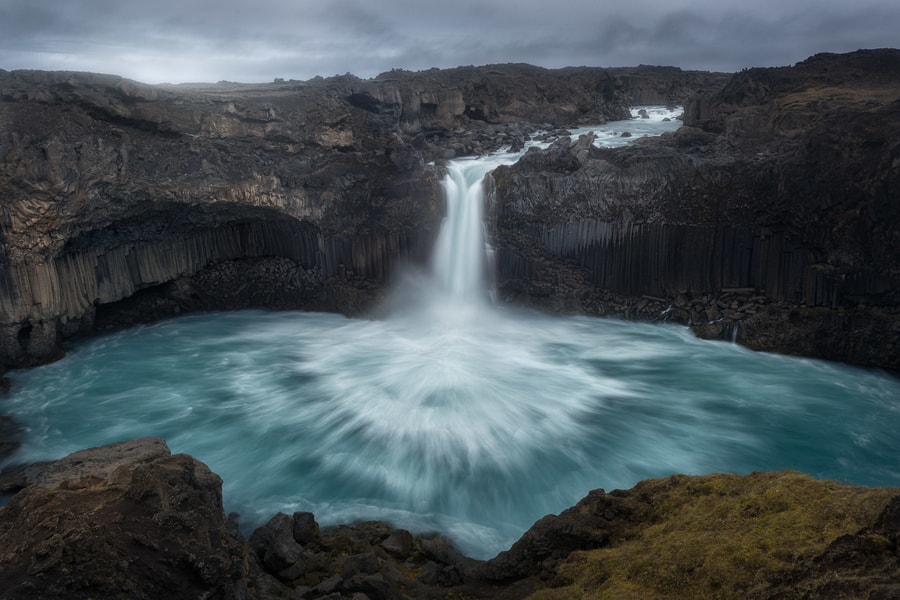
6. Aldeyjafoss, one of the most beautiful Iceland Highlands waterfalls
- How to get there: You’ll have to drive on unpaved roads to get to this Icelandic Highlands waterfall, so a 4×4 is essential. Fortunately, the route is simple, and the roads aren’t bad. Take the 842 in northern Iceland to the F26 and follow it to Aldeyjarfoss. If you continue on this road, you’ll reach Hrafnabjargafoss.
- Difficulty: Low
- River crossing: No
- Accommodation: The Kidagil Guesthouse is the closest accommodation
7. Askja Caldera & Viti Crater, two hidden gems of the Icelandic Highlands
The Askja volcano is one of those remote places where you can enjoy a wonderful tour of the Iceland Highlands.
This volcano covers over 30 square miles and sits in northwestern Iceland in an area with some of the highest volcanic activity in the country. Currently, the area is safe for tourists, and since no eruptions are expected soon, you can visit it.
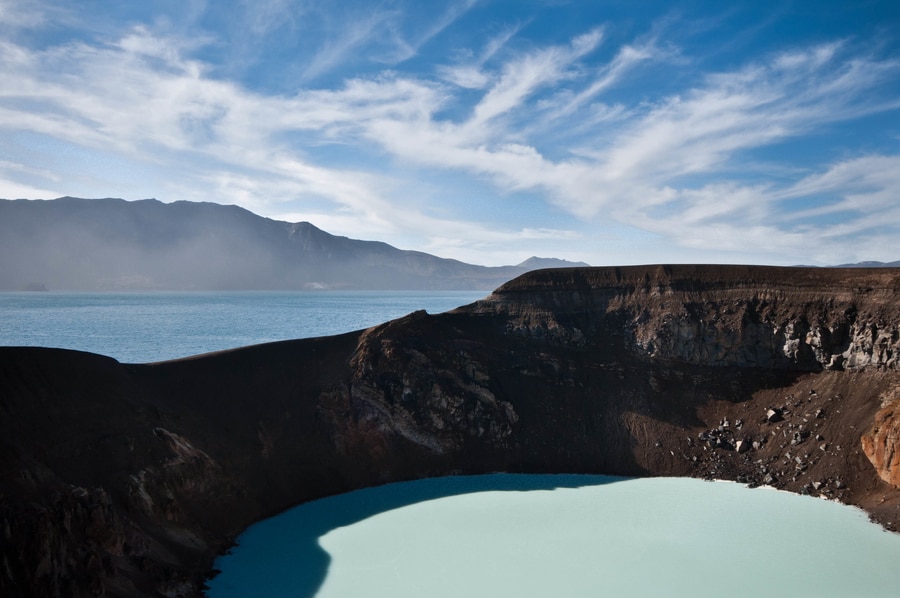
7. Askja Caldera & Viti Crater, two hidden gems of the Icelandic Highlands
One of the main attractions of this place is thermal Lake Víti, which sits inside a volcanic caldera. It’s one of the best places to bathe in the Highlands of Iceland since its milky blue waters stay at around 77 ºF year-round.
- How to get there: To get to Lake Víti, you’ll need a hardy 4×4 since the road that leads to it is in poor condition and intersects with several rivers. If you’d rather not worry about your rental car, another option is to book this tour that departs from Mývatn. Once you reach the parking lot, it’s a bit of a walk to the lake.
- Difficulty: High
- River crossing: Yes
- Accommodation: The best option is to spend the night in Mývatn after visiting the Askja volcano. In our article on where to stay in Iceland, we give you several options around this lake, but I highly recommend the Fosshótel Mývatn.
8. Sigöldugljufur, the most beautiful canyon in the Highlands of Iceland
Sigöldugljufur is one of the most impressive canyons to visit in the Highlands of Iceland. Even though it’s a beautiful place, it isn’t crowded with tourists, so you can enjoy it in peace and at your own pace.
Hundreds of mini falls cascade down the walls of this incredible canyon, creating one of the most magnificent waterfalls in the Icelandic Highlands. Thanks to these delicate waterfalls, the area is known as the Valley of Tears.
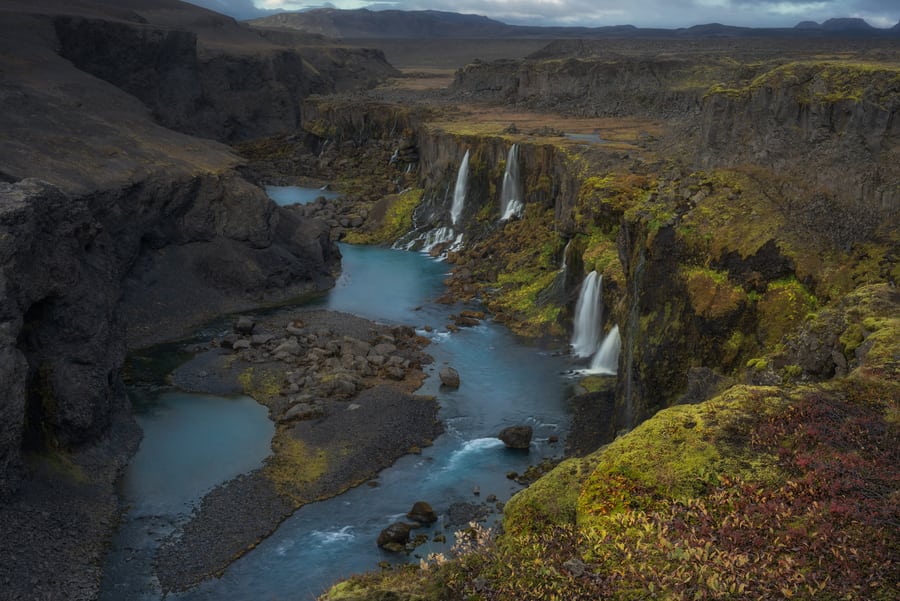
8. Sigöldugljufur, the most beautiful canyon in the Highlands of Iceland
My favorite time to visit Sigöldugljufur is in autumn when the surrounding moss turns red and yellow. It creates a striking contrast against the blue water of the Tungnaá River that runs through the canyon.
Downstream of this river, you’ll find the lovely Sigoldufoss waterfall, another spot I recommend visiting.
- How to get there: Sigöldugljufur is at the start of the F208 road, the same one that leads to Landmannalaugar
- Difficulty: Low
- River crossing: No
- Accommodation: You can stay at the Highland Center Hrauneyjar or go to Landmannalaugar and stay at the mountain resort or campsite there.
9. Ljótipollur, the best place to see the Northern Lights in the Icelandic Highlands
Ljótipollur is a crater in the Veiðavötn volcanic area, specifically within the Fjallabak Nature Reserve. It’s also one of the best places to see the Northern Lights in Iceland. So, if the skies are clear, you’re in luck because you’ll be able to see auroras lighting up the night.
Ljótipollur is halfway between Sigöldugljufur and Landmannalaugar, so you can’t miss it if you’re hiking in the Highlands of Iceland. The crater has a gorgeous lake with aquamarine waters and its walls turned red by iron oxidation, so it’s a must-see.
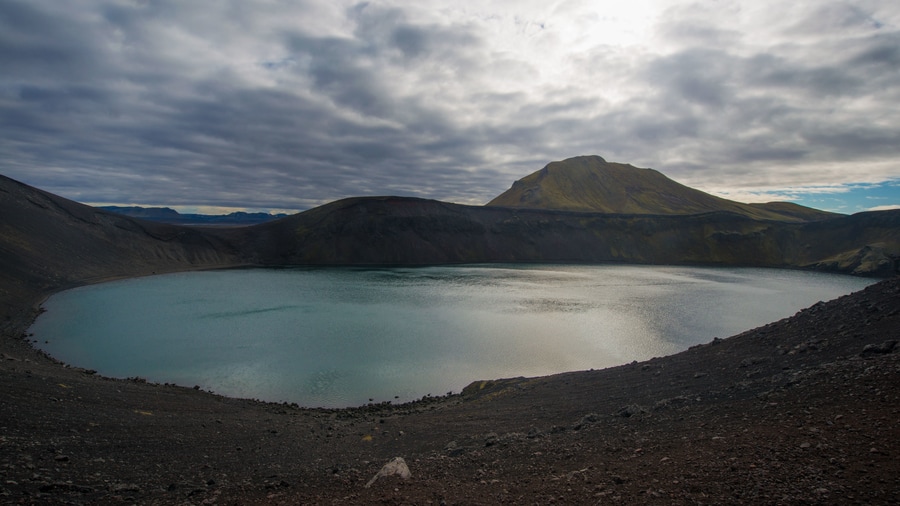
9. Ljótipollur, the best place to see the Northern Lights in the Icelandic Highlands
Other interesting places to see on the way to Landmannalaugar are Lake Bláhylur and the volcanic crater, the immense Lake Frostastaðavatn, and the Stutur Volcanic Crater. The latter is also known as the apple volcano, thanks to its tiny size, perfect shape, and layer of moss that turns green or red depending on the time of year.
- How to get there: Take the F208 road, the same one that leads to Landmannalaugar.
- Difficulty: Low
- River crossing: No
- Accommodation: Camp overnight or stay at the Mountain Hut of Landmannalaugar. All the information can be found here.
10. Fagrifoss, a beautiful waterfall in the Southern Highlands of Iceland
Finally, another place that you cannot miss in the Icelandic Highlands is Fagrifoss, one of the most remote waterfalls that you can visit in this country. It’s near the Fjadrargljufur canyon, which is considered one of the most beautiful canyons in the world, and within the course of the Geirlandsá River in southern Iceland. Fagrifoss translates to beautiful waterfall, and I can assure you that it’ll leave you speechless.
Fagrifoss is unique not only for its beautifully wild environment but also for the way the water cascades and disperses in the lower half of the falls.
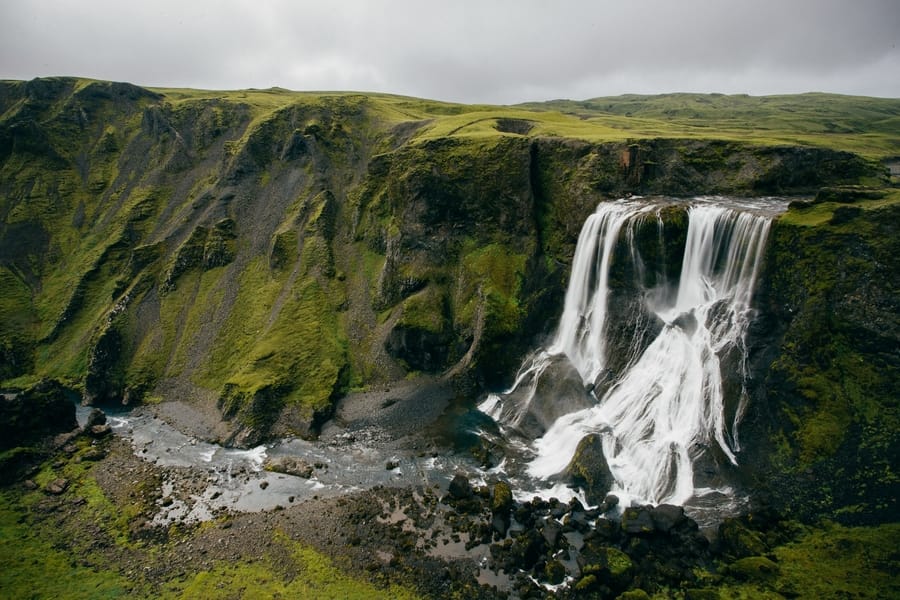
10. Fagrifoss, a beautiful waterfall in the Southern Highlands of Iceland
If you follow the road that takes you to this waterfall, you’ll arrive at Lakagígar, a series of craters that resulted from one of the largest eruptions on record. The Skaftá River Fires took place between 1783 and 1784 and wiped out 20% of Iceland’s population.
- How to get there: From the road that takes you to the Fjadrargljufur canyon, take the F206.
- Difficulty: Medium
- River crossing: No
- Accommodation: The closest accommodation is the Hunkubakkar Guesthouse.
Iceland Highlands map
To help you plan your trip, I suggest taking a look at our map of Iceland. This map of Iceland’s Central Highlands will be useful in creating the perfect Iceland Highlands itinerary that maximizes your time on the island.
Tips for driving the Iceland Highlands F-roads
Although we have an entire guide dedicated to Iceland driving tips, I want to share some helpful hints here that will make it easier to drive Iceland’s Highland f-roads.
- Most importantly, you’ll need a 4×4 since the roads in the Icelandic Highlands are unpaved. You may even need to cross a river to reach some attractions in this area, making a 4-wheel drive vehicle a must.
- Check your Iceland Highlands itinerary ahead of time to see if you’ll need to wade through any rivers (marked with a V on this map). If you need to cross a river, I recommend calling +354-522-1100 to find out how big the rivers are and if the water level is higher than usual. Also, ask them to confirm if your vehicle is suitable for crossing them or if you’ll need a larger 4×4. Not all 4x4s are the same, and in our article on how to drive in Iceland, we have tips on how to ford rivers safely.
- When exiting the Ring Road, keep in mind that you’ll be traveling in remote places, so make sure you have a full tank and enough food and water. You should also bring warm clothing in case the temperatures drop.
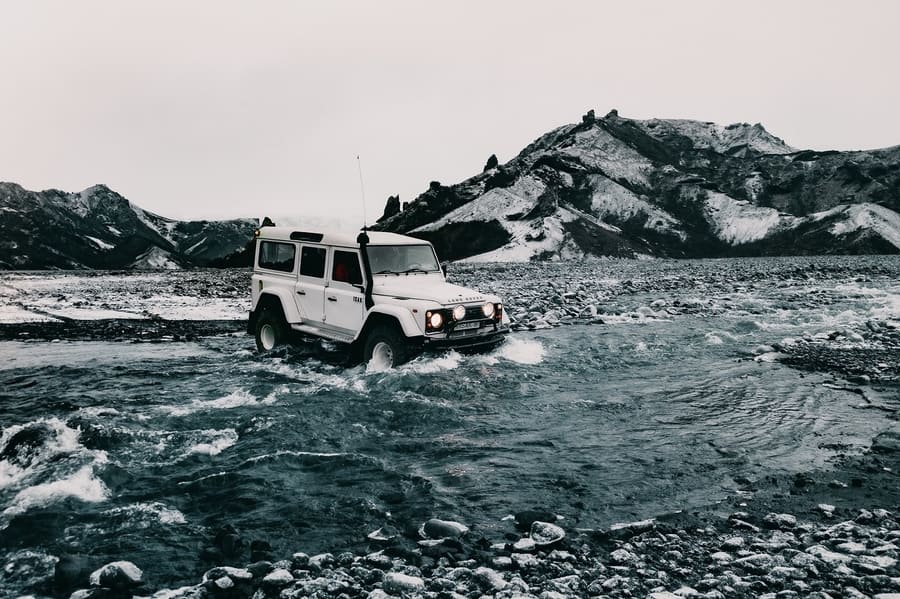
Tips for driving the Iceland Highlands F-roads
- The weather in Iceland is quite variable, and a big storm can start at any moment. Always check Vedur.is for the weather forecast and Road.is for road conditions. Keep in mind that f-roads close in the winter, but you can check the approximate opening dates here. To see current road conditions throughout the Icelandic Highlands, check this map.
- Remember that time estimates given by the GPS are only approximate times. Due to road conditions, it will probably take you longer to reach your destination. Besides, the speed limit on Iceland’s Highlands f-roads is 30 mph.
- Always request a travel plan on Safetravel.is. This way, if you get stuck somewhere, they can find you quickly and easily.
- There is no cell coverage in the Highlands. This means you won’t be able to use your conventional GPS, so I recommend you download an app like Maps.me as well as our road map of Iceland.
- If you don’t have a satellite communicator, I suggest renting a personal location beacon (PLB), which costs 1200 ISK (about $10.) We have the Garmin inReach to keep track of our location at all times. In case of an emergency, having this device can save your life.
Highlands of Iceland tours
As you plan your Icelandic Highlands self-drive excursion, you may notice that some areas are difficult or dangerous to reach on your own due to poor road conditions and substantial rivers. If you want to see these places, or if you prefer not to drive, there are tours from Reykjavik and other towns that will take you to the Highlands’ main attractions.
Now you know all the places and attractions you can see in the Icelandic Highlands, one of the most beautiful places in the country. Again, if you’re renting a vehicle, remember to drive with extreme caution on the f-roads.
Also, if you have any questions, leave me a comment below and I’ll be happy to help you. You can even tell me about your experience touring the Highlands of Iceland. I hope you enjoy this country as much we do! Safe travels!
